全新版大学英语综合教程第二册教案Unit 4 book2
- 格式:doc
- 大小:95.50 KB
- 文档页数:15
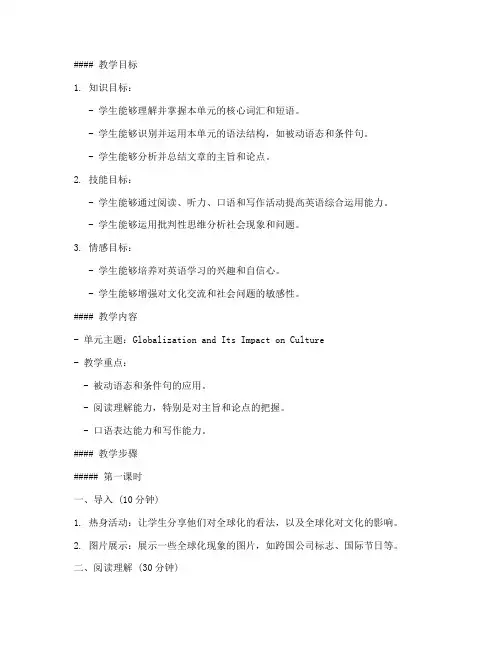
#### 教学目标1. 知识目标:- 学生能够理解并掌握本单元的核心词汇和短语。
- 学生能够识别并运用本单元的语法结构,如被动语态和条件句。
- 学生能够分析并总结文章的主旨和论点。
2. 技能目标:- 学生能够通过阅读、听力、口语和写作活动提高英语综合运用能力。
- 学生能够运用批判性思维分析社会现象和问题。
3. 情感目标:- 学生能够培养对英语学习的兴趣和自信心。
- 学生能够增强对文化交流和社会问题的敏感性。
#### 教学内容- 单元主题:Globalization and Its Impact on Culture- 教学重点:- 被动语态和条件句的应用。
- 阅读理解能力,特别是对主旨和论点的把握。
- 口语表达能力和写作能力。
#### 教学步骤##### 第一课时一、导入 (10分钟)1. 热身活动:让学生分享他们对全球化的看法,以及全球化对文化的影响。
2. 图片展示:展示一些全球化现象的图片,如跨国公司标志、国际节日等。
二、阅读理解 (30分钟)1. 阅读课文:让学生阅读Unit 4的课文,注意生词和难句。
2. 讨论问题:提出一些问题引导学生思考,如:- 文章的主要论点是什么?- 全球化对文化产生了哪些积极和消极的影响?- 你认为应该如何应对全球化带来的挑战?三、词汇学习 (20分钟)1. 词汇讲解:讲解本单元的核心词汇,如globalization, culture shock, hybrid culture等。
2. 词汇练习:进行词汇练习,如填空、匹配等。
##### 第二课时一、听力训练 (20分钟)1. 听力材料:播放与全球化相关的听力材料。
2. 听力练习:让学生回答听力材料中的问题,如:- 文章的主要观点是什么?- 说话者对全球化的态度是什么?二、口语表达 (30分钟)1. 小组讨论:让学生分成小组,讨论全球化对个人和社会的影响。
2. 角色扮演:让学生进行角色扮演,模拟不同的文化背景下的交流。
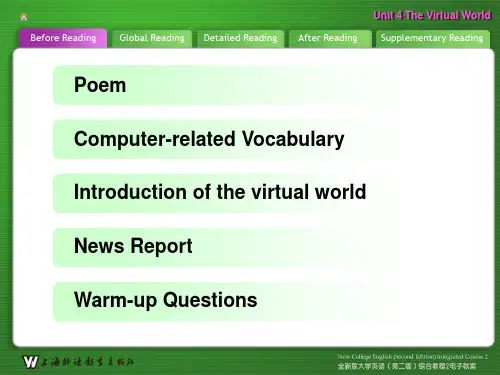
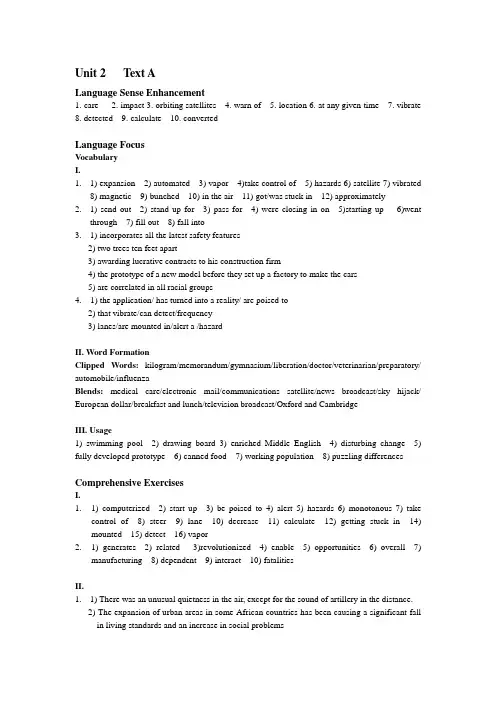
Unit 2 Text ALanguage Sense Enhancement1. care2. impact3. orbiting satellites4. warn of5. location6. at any given time7. vibrate8. detected9. calculate 10. convertedLanguage FocusVocabularyI.1.1) expansion 2) automated 3) vapor 4)take control of 5) hazards 6) satellite 7) vibrated8) magnetic 9) bunched 10) in the air 11) got/was stuck in 12) approximately2.1) send out 2) stand up for 3) pass for 4) were closing in on 5)starting up 6)wentthrough 7) fill out 8) fall into3.1) incorporates all the latest safety features2) two trees ten feet apart3) awarding lucrative contracts to his construction firm4) the prototype of a new model before they set up a factory to make the cars5) are correlated in all racial groups4. 1) the application/ has turned into a reality/ are poised to2) that vibrate/can detect/frequency3) lanes/are mounted in/alert a /hazardII. Word FormationClipped Words:kilogram/memorandum/gymnasium/liberation/doctor/veterinarian/preparatory/ automobile/influenzaBlends:medical care/electronic mail/communications satellite/news broadcast/sky hijack/ European dollar/breakfast and lunch/television broadcast/Oxford and CambridgeIII. Usage1) swimming pool 2) drawing board 3) enriched Middle English 4) disturbing change 5) fully developed prototype 6) canned food 7) working population 8) puzzling differencesComprehensive ExercisesI.1.1) computerized 2) start up 3) be poised to 4) alert 5) hazards 6) monotonous 7) takecontrol of 8) steer 9) lane 10) decrease 11) calculate 12) getting stuck in 14) mounted 15) detect 16) vapor2.1) generates 2) related 3)revolutionized 4) enable 5) opportunities 6) overall 7)manufacturing 8) dependent 9) interact 10) fatalitiesII.1.1) There was an unusual quietness in the air, except for the sound of artillery in the distance.2) The expansion of urban areas in some African countries has been causing a significant fallin living standards and an increase in social problems3) The research shows that atmospheric carbon dioxide levels are closely correlated withglobal temperatures4) The frequency of the bus service has been improved from 15 to 12 minute recently.5) The diver stood on the edge of the diving board, poised to jump at the signal from thecoach.2.Automobiles have, since their invention, revolutionized transportation, changing forever theway people travel, and do business. On the other hand, they have brought hazards, especially highway fatalities. However, today the application of computer technology and electronic sensors in designing and manufacturing cars makes it possible to eliminate most of traffic accidents. For example, electronic sensors mounted in your car can detect alcohol vapor in the air and refuse to start up the engine. They can also monitor road conditions by receiving radio signals sent out from orbiting satellites and greatly reduce your chances of getting stuck in traffic jams.Text BComprehension Check1. a c c d b bTranslation1.这类系统易受气候变化的影响,提供的数据不够精确,但他们不需要特别的道路设施,只需要将车道标志维护好就行了。
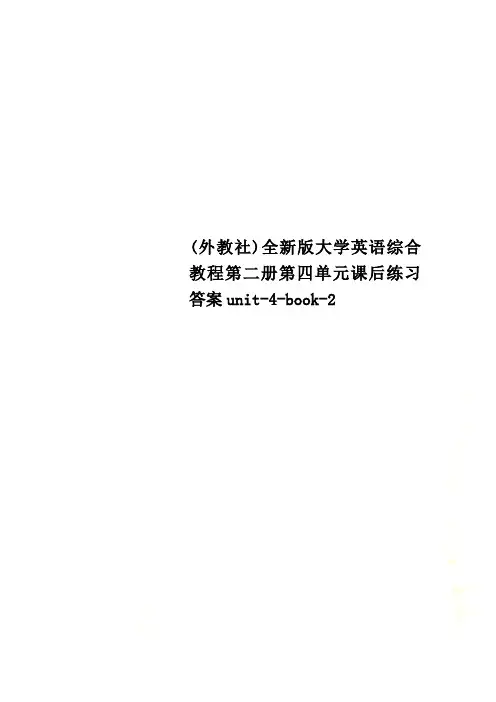
(外教社)全新版大学英语综合教程第二册第四单元课后练习答案unit-4-book-2Unit4 The Virtual WorldPart II Reading TaskComprehensionContent QuestionPair Work1.She used to be a television producer, but now she is a writer.2.She writes and edits articles online, submits them via email, and communicates with colleagues via the Internet, too.3.She could stay computer-assisted at home for weeks, going out only t get mail, newspapers and groceries.4.They feel as if they had become one with the computer, and life seems to be unreal.5.That people who grew used to a virtual life would feel an aversion to outside forms of socializing.6.She gets overexcited, speaks too much, and interrupts others.7.She is bad-tempered, easily angered, and attacks everyone in sight, all because she has8.9.111.122.The first paragraph describes the consequences of living a virtual life and the last tells of the author’s escape back into it. Together, they bring out the dilemma people at present are in: Because of modern technology, we have a choice between a virtual life and real life, but find both unsatisfactory.Language Sense Enhancement1.(1)routin e(2)for company (3)unemp loyment (4)externally(5)drugabuse(6)restore(7)fled(8)gym(9)setapart(10)appointmentsVocabulary I1.1)conversel y2)but then3)symptom4)spitting5)abusing 6)tone7)took; in8)editing9)havearranged10)insight11)stretched12)data2.1)smoking cigarettes jars on me.2)find themselves getting sucked in.3)has arranged for a technician from thecomputer store to check and repair it.4)fled their country to avoid militaryservice/fled to other countries to avoid military service.5)restore people’s confidence in it.3.1)the virtual; on line; via2)nightmare; routine; any appointment;arrange for3)cue; remarks; his tuneI.Collocation1.We came here all the way on foot.2.Private cars are not allowed on campus.3.They are on vacation in Florida.4.Mary has been talking to her friend on the phone for an hour.5.Don’t worry, Lucy is always on time.6.Industrial demand on fuel is on the rise.II.U sage1.hard2.difficult3.impossible4.tough5.hard6.easyprehensive Exercises IV.cloze1.(1)Intern et(2)click(3)virtual(4)routin es(5)arrang e (6)nightmare(7)annoying(8)connection(9)crawls(10)take in(11)spit(12)data(13)suckedinto(14)Attimes(15)flee(16)on line2.(1)compa nion (2)deliver(3)access(4)enable s(5)custom ers (6)delight s(7)provid es(8)small(9)remote(10)inform ationV.T ranslation1.1)Research shows that laughter can bring alot of health benefits.2)A show Internet connection speed is reallyannoying.3)As the law stands, helping someone commitsuicide is a crime.4)In her report, Mary tries to interpret thedata from a completely different angle.5)Sue is a girl of great talent. Her amazingmemory sets her apart from her classmates. 2.Perhaps you envy me for being able to work from home on the computer. I agree that the Internet has made my job a lot easier. I can write, submit and edit articles via email, chat with my colleagues on line and discuss work with my boss. With a click of the mouse, I can get all the data I need and keep up with the latest news. But then, communicating through the Net can be frustrating at times. The systemmay crash. Worse still, without the emotional cues of face-to-face communication, the typed words sometimes seem difficult to interpret.。
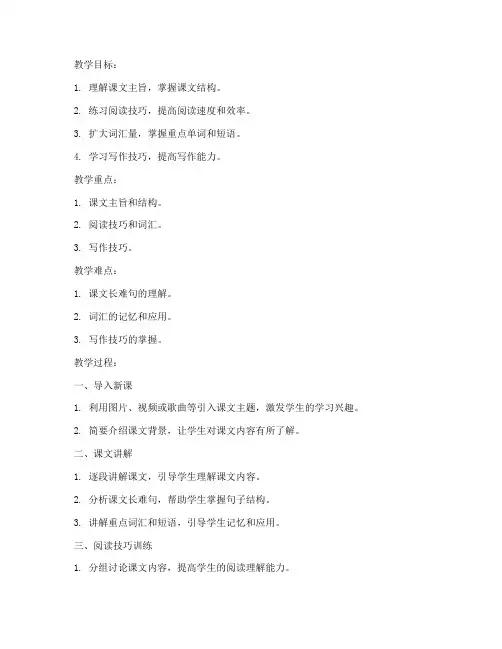
教学目标:1. 理解课文主旨,掌握课文结构。
2. 练习阅读技巧,提高阅读速度和效率。
3. 扩大词汇量,掌握重点单词和短语。
4. 学习写作技巧,提高写作能力。
教学重点:1. 课文主旨和结构。
2. 阅读技巧和词汇。
3. 写作技巧。
教学难点:1. 课文长难句的理解。
2. 词汇的记忆和应用。
3. 写作技巧的掌握。
教学过程:一、导入新课1. 利用图片、视频或歌曲等引入课文主题,激发学生的学习兴趣。
2. 简要介绍课文背景,让学生对课文内容有所了解。
二、课文讲解1. 逐段讲解课文,引导学生理解课文内容。
2. 分析课文长难句,帮助学生掌握句子结构。
3. 讲解重点词汇和短语,引导学生记忆和应用。
三、阅读技巧训练1. 分组讨论课文内容,提高学生的阅读理解能力。
2. 进行阅读速度和效率的训练,如快速阅读、略读、扫读等。
四、词汇学习1. 列出课文中的重点单词和短语,引导学生记忆。
2. 设计词汇练习,如填空、翻译、选择题等,巩固所学词汇。
五、写作技巧讲解1. 分析课文中的写作技巧,如句式、段落结构等。
2. 讲解写作技巧,如如何开头、如何过渡、如何结尾等。
六、写作练习1. 学生根据所学写作技巧,进行写作练习。
2. 教师批改作文,指出学生存在的问题,并进行讲解。
七、课堂小结1. 总结本节课所学内容,强调重点和难点。
2. 布置课后作业,如复习课文、完成写作练习等。
教学评价:1. 课堂表现:观察学生在课堂上的参与度、积极性等。
2. 课后作业:检查学生完成作业的情况,了解学生对课文内容的掌握程度。
3. 写作练习:评价学生的写作技巧和写作水平。
教学资源:1. 教材:《全新版大学英语综合教程2》2. 课件:制作与课文内容相关的课件,如图片、视频等。
3. 教学参考书:参考相关教学参考书,了解教学方法和技巧。
备注:1. 根据学生的实际情况,适当调整教学内容和进度。
2. 注重培养学生的阅读兴趣和写作能力,提高学生的英语综合素养。
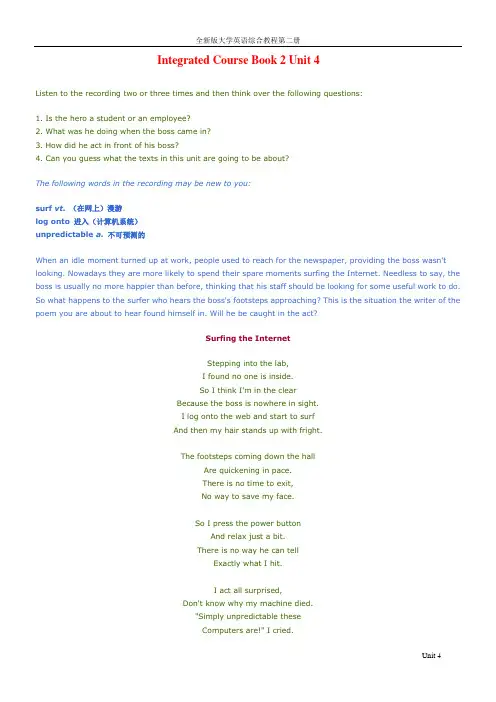
Integrated Course Book 2 Unit 4Listen to the recording two or three times and then think over the following questions:1. Is the hero a student or an employee?2. What was he doing when the boss came in?3. How did he act in front of his boss?4. Can you guess what the texts in this unit are going to be about?The following words in the recording may be new to you:surf vt.(在网上)漫游log onto 进入(计算机系统)unpredictable a.不可预测的When an idle moment turned up at work, people used to reach for the newspaper, providing the boss wasn't looking. Nowadays they are more likely to spend their spare moments surfing the Internet. Needless to say, the boss is usually no more happier than before, thinking that his staff should be looking for some useful work to do. So what happens to the surfer who hears the boss's footsteps approaching? This is the situation the writer of the poem you are about to hear found himself in. Will he be caught in the act?Surfing the InternetStepping into the lab,I found no one is inside.So I think I'm in the clearBecause the boss is nowhere in sight.I log onto the web and start to surfAnd then my hair stands up with fright.The footsteps coming down the hallAre quickening in pace.There is no time to exit,No way to save my face.So I press the power buttonAnd relax just a bit.There is no way he can tellExactly what I hit.I act all surprised,Don't know why my machine died."Simply unpredictable theseComputers are!" I cried."So we'll get you a new one,A computer that won't crash", he exclaims.Do you think he'll wonderWhen the new one acts the same?intergrated courseMaia Szalavitz, formerly a television producer, now spends her timeas a writer. In this essay she explores digital reality and itsconsequences. Along the way, she compares the digital world to the "real"world, acknowledging the attractions of the electronic dimension.迈亚·塞拉维茨曾是电视制片人,目前从事写作。
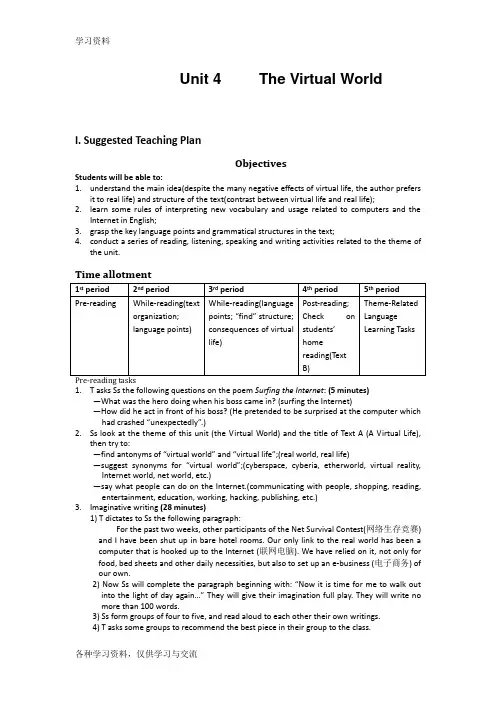
Unit 4 The Virtual WorldI. Suggested Teaching PlanObjectivesStudents will be able to:1.understand the main idea(despite the many negative effects of virtual life, the author prefersit to real life) and structure of the text(contrast between virtual life and real life);2.learn some rules of interpreting new vocabulary and usage related to computers and theInternet in English;3.grasp the key language points and grammatical structures in the text;4.conduct a series of reading, listening, speaking and writing activities related to the theme ofthe unit.Time allotment1.T asks Ss the following questions on the poem Surfing the Internet: (5 minutes)—What was the hero doing when his boss came in? (surfing the Internet)—How did he act in front of his boss? (He pretended to be surprised at the computer which had crashed “unexpectedly”.)2.Ss look at the theme of this unit (the Virtual World) and the title of Text A (A Virtual Life),then try to:—find antony ms of “virtual world” and “virtual life”;(real world, real life)—suggest synonyms for “virtual world”;(cyberspace, cyberia, etherworld, virtual reality, Internet world, net world, etc.)—say what people can do on the Internet.(communicating with people, shopping, reading, entertainment, education, working, hacking, publishing, etc.)3.Imaginative writing (28 minutes)1) T dictates to Ss the following paragraph:For the past two weeks, other participants of the Net Survival Contest(网络生存竞赛) and I have been shut up in bare hotel rooms. Our only link to the real world has been a computer that is hooked up to the Internet (联网电脑). We have relied on it, not only for food, bed sheets and other daily necessities, but also to set up an e-business (电子商务) of our own.2) Now Ss will complete the paragraph beginning with: “Now it is time for me to walk outinto the light of day again…” They will give their imagination full play. They will write no more than 100 words.3) Ss form groups of four to five, and read aloud to each other their own writings.4) T asks some groups to recommend the best piece in their group to the class.4.T may lead in to Text A by saying: Some of us like to live a life in contact with real things andreal people, but others favor a virtual exist ence. Which life is better? I’m sure you have different opinions. Now let’s read Text A to find out what Maia Szalavitz has to say about these two life styles. (2 minutes)While-reading tasks1.Text organization (15 minutes)1)T draws Ss’ attention to Text Org anization Exercise 1, and lets them read its instructionas well as what has already been done for them in this exercise.2)Ss try to complete the exercise by simply reading the sentence of each paragraph in TextA.3)Ss compare answers with each other; if necessary, T may help.2.T explains the key language points and gives Ss practice (Language study). (45 minutes)3.T guides Ss through Structure Exercise 2. (10 minutes)4.Ss re-read Paras 4-10, work in pairs to find out consequences of “my” virtual life. Can theyuse the “find oneself + adj./past participle/present participle” structure when summing up the consequences? (10 minutes)5.Some pairs report to the class their findings, using the “find” structure. (5 minutes)Post reading tasksputer-related vocabulary items (20 minutes)1)Ss scan Text A to find out vocabulary items to computer and the Internet. (They are:virtual life, the net, telecommuter, email, Internet mailing lists, computer-assisted, data, link, cyber-interaction, on line, system cash, click on the modem, connection, password)2)T tells Ss that new terms related to computer and the Internet are constantly added tothe English vocabulary, so much so that many of them are not included in any English dictionary. However, if we apply certain rules, their meanings are easy to deduce.3)T gives Ss more examples of computer-related vocabulary items (see Text Analysis)2.T guides Ss through some after-text exercises. (25 minutes)3.T checks on Ss’ home reading (Text B). (3 minutes)4.Ss do Part IV: Theme-Related Language Learning Tasks. (1 period)5.T asks Ss to prepare the next unit: (2 minutes)1)do the pre-reading task2)preview Text A.II. Text AnalysisThe most dynamic combining forms/prefixes for new computer-and-Internet-related vocabulary in /English are cyber-, virtual, net- (net-), Web- (web-), and E- (e-).New English vocabulary items derived from them usually appear in the following forms:bining forms/prefixes+ noun: this is the most common type, e.g. virtual life(虚拟生活),virtual world(虚拟世界)virtual reality(虚拟现实),cyber-interaction(网络互动),cyberculture(网络文化), cybernut(网虫),cyberpet(电子宠物),cyberspace(网络空间), netwriter(放送电子邮件的人), nethead(网虫), Webmaster(网站维护者), Web page(网页), Website(网站), WebTV(网络电视机),E-book(电子书籍),E-shopper (网上购物者), e-card(电子贺卡),e-journal(电子杂志),e-business(电子商务), e-cash (电子货币), e-commerce(电子商务).bining forms/prefixes + verb: e.g. cybersurf(网络漫游), netsurf(网络漫游), websurf,(网络漫游),email (发送电子邮件)3.words like cyber, net, etc. + suffix: e.g. cyberian(网络用户),cyberphobia(电脑恐惧症)cybernaut (网络用户),netter(网民)Webify(使万维网化)cyberize(使联网)4.clipped word: cyberdoc(网络医生),Netcast(网络播放), Netiquette(网规), Netizen(网民),Netpreneur(网络企业家)Webcam(网络摄象机),Webcasting(网络播放)Webliography(网络书目), Webnomics(网络经济),Webzine网络杂志),e- tailing (电子零售), e-zine(电子杂志).III. Cultural Notes1.The Internet:an international computer network for the exchange of information. It wasoriginally used mainly in the academic and military worlds but has since become available to the large and increasing number of people with personal computers. Other services, e.g. the World Wide Web, are available through it.The Internet is changing our lives and a parallel universe is rapidly emerging online. Today there is scarcely an aspect of our life that isn’t being upended by the torrent of information available on the hundreds of millions of sites crowding the Internet, not to mention its saving companies billions of dollars in producing goods and serving the needs of their customers.Nothing like it has been seen since the beginning of the Industrial Revolution, when power-driven machines began producing more in a day than men could turn out in nearly a year. The Internet and e-commerce are viewed as a global megatrend along the lines of the printing press, the telephone, the computer and the electricity.You would be hard pressed to name something that isn’t available on the Internet.Consider: books, health care, movie tickets, baby clothes, stocks, real estate, toys and airline tickets. American kids today are so computer savvy that it virtually ensures the United States will remain the unchallenged leader in cyberspace for the foreseeable future. Most kids use computers to play games and have email chats with friends.What’s clear is that, whatever we like it or not, the Internet is an ever-growing part of our lives and there is no turning back.2.NBC (the National Broadcasting Company):the first of the original three US nationalbroadcasting companies. It was established in 1926 by Radio Corporation of America as two groups of radio stations. The first NBC television channel opened in 1940. The company is now owned by General Electric. Its main offices are at Rockefeller Center in New York.3.PBS ( the Public Broadcasting Services):(in the US) a television system that broadcastsprograms to an association of local stations which use no television advertisements and do not make a profit. It was established by the Public Broadcasting Act and is supported by money from the US Government, large companies and the public. PBS is known for the high quality of its programs.4.ABC ( the American Broadcasting Company):one of the original three major televisionnetworks in American. It began in 1943 as the Blue Networks of six radio stations. ABC is now owned by the Walt Disney Company.IV. Language Study1.virtual: 1) created and existing only in a computer 虚拟的can visit a virtual store and put what I want in my basket at the click of a mouse button. Some people spend too much time escaping from reality into the virtual world conjuring up on their computer screens.2) being or acting as what is described, but not accepted as such in name or officially 差不多的,实质上的He claimed to be a virtual prisoner in his own home.The world’s governments have done virtually nothing to combat the threat of nuclear accidents.virtual world 虚拟世界virtual community虚拟社区virtual pet虚拟宠物virtual reality 虚拟现实2.interpret: 1) make clear the meaning of (either in words or by artistic performance) 解释,说明Poetry helps to interpret life.The professor tried to interpret the difficult passage in the book.2) consider to be the meaning of 认为是……的意思She interprets the dream as an unconscious desire to be young again.We interpreted his silence as a refusal.They are worried that the students might interpret the new regulation as a restriction of their rights.3) translate what is said in one language into another 作口译No one in the tour group spoke Spanish so we had to ask the guide to interpret.He worked as a interpreter at the UN’ s World Summit on Sustainable Development.他在联合国可持续发展大会上担任口译。
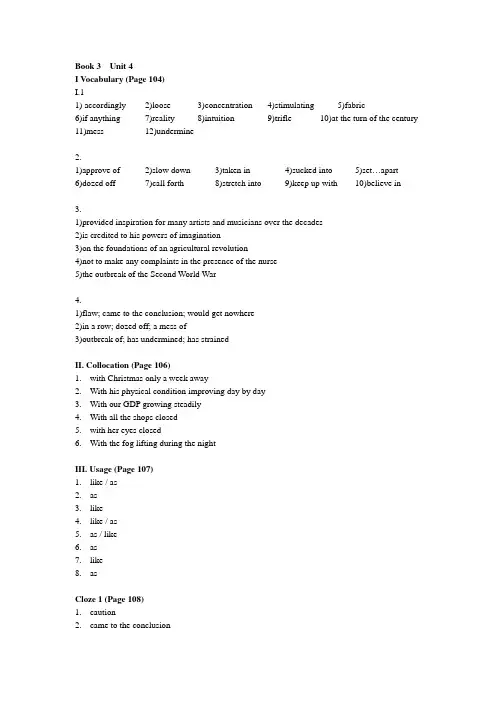
Book 3 Unit 4I Vocabulary (Page 104)I.11) accordingly 2)loose 3)concentration 4)stimulating 5)fabric6)if anything 7)reality 8)intuition 9)trifle 10)at the turn of the century 11)mess 12)undermine2.1)approve of 2)slow down 3)taken in 4)sucked into 5)set…apart6)dozed off 7)call forth 8)stretch into 9)keep up with 10)believe in3.1)provided inspiration for many artists and musicians over the decades2)is credited to his powers of imagination3)on the foundations of an agricultural revolution4)not to make any complaints in the presence of the nurse5)the outbreak of the Second World War4.1)flaw; came to the conclusion; would get nowhere2)in a row; dozed off; a mess of3)outbreak of; has undermined; has strainedII. Collocation (Page 106)1.with Christmas only a week away2.With his physical condition improving day by day3.With our GDP growing steadily4.With all the shops closed5.with her eyes closed6.With the fog lifting during the nightIII. Usage (Page 107)1.like / as2.as3.like4.like / as5.as / like6.as7.like8.asCloze 1 (Page 108)1.caution2.came to the conclusion3.never get anywhere4.undermining5.not give / care a fig6.flaw7.beyond any doubt8.foundation9.remarkable / impressive10.imaginationCloze 2 (Page 109)1.extent2.inventions3.bet4.manages5.vision6.eventually7.achievement8.poverty9.utilized10.breakthroughTranslation (Page 109)1.The volunteers sent / assigned by the Red Cross disinfected, with great caution , the drinkingwater in the village so as to avoid an outbreak of plague.2.Einstein spent many years trying to unify the theories of electromagnetism and gravity butfailed.3.Professor Wang received / won the Presidential A ward for his excellence in stimulatingstudents’ creative imagination.4.As there were some major design flaws, the board of directors didn’t approve of the economicstimulus package.5.Having realized that nobody could help him, Jordan finally came to the conclusion that he hadto face reality and take up / meet the challenge by himself.What was remarkable about 2005 was perhaps that the United Nations declared it “The World Y ear of Physics ”. It was the 100th anniversary of Einstein’s theory of relativity and the 50th anniversary of his death. In 1905, Einstein published five highly important essays in the history of science, thus revolutionizing physics. His great achievements can be credited to his impressive powers of imagination, constant questioning, and not giving a fig for authority. It is beyond doubt that Einstein was the greatest scientist in the 20th century.。
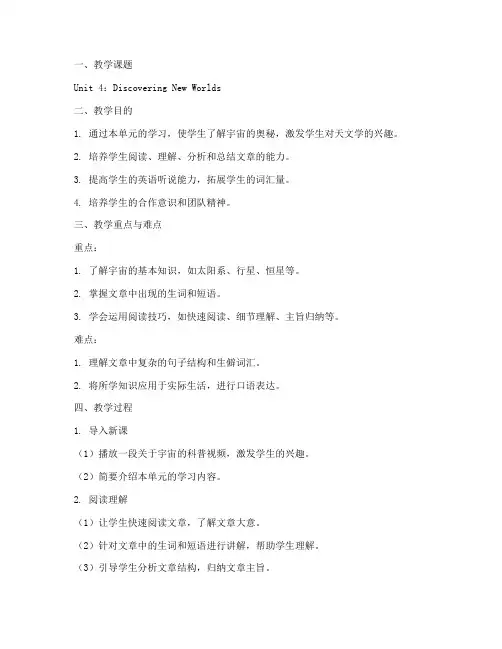
一、教学课题Unit 4:Discovering New Worlds二、教学目的1. 通过本单元的学习,使学生了解宇宙的奥秘,激发学生对天文学的兴趣。
2. 培养学生阅读、理解、分析和总结文章的能力。
3. 提高学生的英语听说能力,拓展学生的词汇量。
4. 培养学生的合作意识和团队精神。
三、教学重点与难点重点:1. 了解宇宙的基本知识,如太阳系、行星、恒星等。
2. 掌握文章中出现的生词和短语。
3. 学会运用阅读技巧,如快速阅读、细节理解、主旨归纳等。
难点:1. 理解文章中复杂的句子结构和生僻词汇。
2. 将所学知识应用于实际生活,进行口语表达。
四、教学过程1. 导入新课(1)播放一段关于宇宙的科普视频,激发学生的兴趣。
(2)简要介绍本单元的学习内容。
2. 阅读理解(1)让学生快速阅读文章,了解文章大意。
(2)针对文章中的生词和短语进行讲解,帮助学生理解。
(3)引导学生分析文章结构,归纳文章主旨。
3. 练习巩固(1)让学生完成课后练习,巩固所学知识。
(2)进行小组讨论,让学生分享自己的看法和感受。
4. 口语表达(1)让学生用所学词汇和短语描述自己心中的宇宙。
(2)组织学生进行角色扮演,模拟天文馆参观场景。
5. 总结与作业(1)对本节课所学内容进行总结,强调重点和难点。
(2)布置课后作业,要求学生阅读相关资料,了解更多关于宇宙的知识。
五、课时分配1. 导入新课:10分钟2. 阅读理解:30分钟3. 练习巩固:20分钟4. 口语表达:20分钟5. 总结与作业:10分钟六、教学手段、教具1. 教学手段:多媒体、黑板、PPT2. 教具:教材、练习册、科普视频、图片等七、板书设计1. Unit 4:Discovering New Worlds2. 天文学基本知识3. 生词和短语4. 阅读技巧5. 口语表达八、课后分析及教学参考资料1. 教师可根据学生的实际情况,调整教学内容和进度。
2. 教学参考资料:天文学相关书籍、网站、视频等。
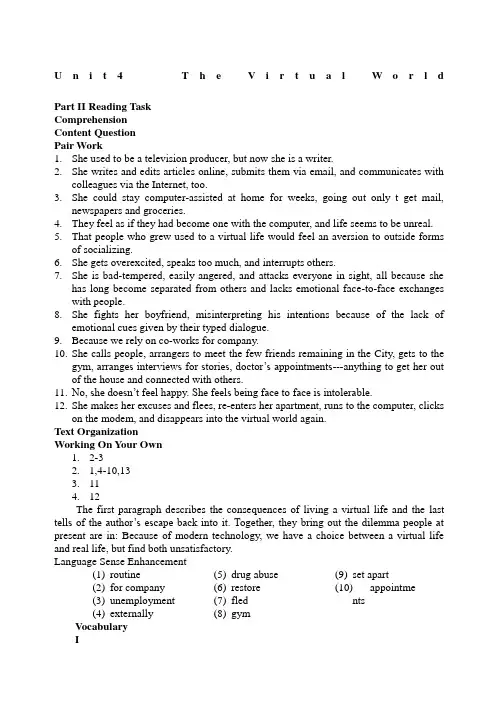
U n i t4T h e V i r t u a l W o r l d Part II Reading TaskComprehensionContent QuestionPair Work1.She used to be a television producer, but now she is a writer.2.She writes and edits articles online, submits them via email, and communicates withcolleagues via the Internet, too.3.She could stay computer-assisted at home for weeks, going out only t get mail,newspapers and groceries.4.They feel as if they had become one with the computer, and life seems to be unreal.5.That people who grew used to a virtual life would feel an aversion to outside formsof socializing.6.She gets overexcited, speaks too much, and interrupts others.7.She is bad-tempered, easily angered, and attacks everyone in sight, all because shehas long become separated from others and lacks emotional face-to-face exchanges with people.8.She fights her boyfriend, misinterpreting his intentions because of the lack ofemotional cues given by their typed dialogue.9.Because we rely on co-works for company.10.She calls people, arrangers to meet the few friends remaining in the City, gets to thegym, arranges interviews for stories, doctor’s appointments---anything to get her out of the house and connected with others.11.No, she doesn’t feel happy. She feels being face to face is intolerable.12.She makes her excuses and flees, re-enters her apartment, runs to the computer, clickson the modem, and disappears into the virtual world again.Text OrganizationWorking On Your Own1.2-32.1,4-10,133.114.12The first paragraph describes the consequences of living a virtual life and the last tells of the author’s escape back into it. Together, they bring out the dilemma people at present are in: Because of modern technology, we have a choice between a virtual life and real life, but find both unsatisfactory.Language Sense Enhancement(1)routine(2)for company(3)unemployment(4)externally (5)drug abuse(6)restore(7)fled(8)gym(9)set apart(10)appointmentsVocabulary I1)conversely2)but then3)symptom4)spitting 5)abusing6)tone7)took; in8)editing9)have arranged10)in sight11)stretched12)data1)smoking cigarettes jars on me.2)find themselves getting sucked in.3)has arranged for a technician from the computer store to check andrepair it.4)fled their country to avoid military service/fled to other countries toavoid military service.5)restore people’s confidence in it.1)the virtual; on line; via2)nightmare; routine; any appointment; arrange for3)cue; remarks; his tuneI.Collocation1.We came here all the way on foot.2.Private cars are not allowed on campus.3.They are on vacation in Florida.4.Mary has been talking to her friend on the phone for an hour.5.Don’t worry, Lucy is always on time.6.Industrial demand on fuel is on the rise.age1.hard2.difficult3.impossible4.tough5.hard6.easyprehensive Exercises IV.cloze(1)Internet(2)click(3)virtual(4)routines(5)arrange(6)nightmare (7)annoying(8)connection(9)crawls(10)take in(11)spit(12)data(13)sucked into(14)At times(15)flee(16)on line(1)companion(2)deliver(3)access(4)enables(5)customers(6)delights(7)provides(8)small(9)remote(10)informationV.Translation1)Research shows that laughter can bring a lot of health benefits.2) A show Internet connection speed is really annoying.3)As the law stands, helping someone commit suicide is a crime.4)In her report, Mary tries to interpret the data from a completelydifferent angle.5)Sue is a girl of great talent. Her amazing memory sets her apart fromher classmates.Perhaps you envy me for being able to work from home on the computer. I agree that the Internet has made my job a lot easier. I can write, submit and edit articles via email, chat with my colleagues on line and discuss work with my boss. With a click of the mouse, I can get all the data I need and keep up with the latest news. But then, communicating through the Net can be frustrating at times. The system may crash. Worse still, without the emotional cues of face-to-face communication, the typed words sometimes seem difficult to interpret.。
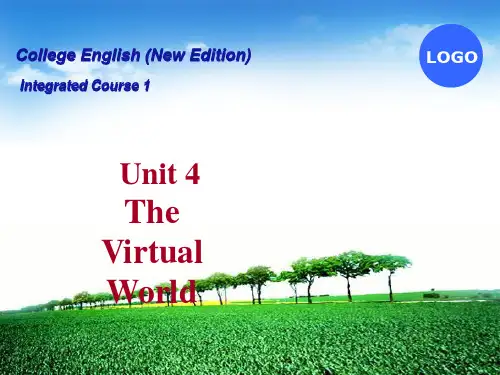
Unit 4 Cultural EncountersSection Two Global ReadingI. Text analysis1.Which sentence is the thesis statement?The last sentence of the 3rd paragraph: ―Most fundamental is the profound relationship between language and culture that lies at the heart of society and one that we overlook at our peril.‖promising, in the author’s view, is a key notion in translation and thus also inintercultural communication. Numerous examples are used to explain this notion. Try to find these examples.Paragraph 4: The lack of an exact counterpart of the English word ―homesickness‖ in other languages such as Italian, Portuguese, and German.Paragraph 5: The problem of untranslatability which the early Bible translators encountered.Paragraph 6: English and Welsh speakers make adjustments regarding the color spectrum in the grey / green / blue / brown range; the flat breads of Central Asia are a long way away from Mother’s Pride white sliced toasties, yet the word ―bread‖ has to serve for both.II Structural analysis1.What type of writing is this essay? And what’s the main strategy the author adopt to developthe body of the essay?It is a piece of argumentation. Abundant examples are provided to support her argument in the body of the essay.Section Three Detailed ReadingText ICultural EncountersSusan Bassnett1Inevitably,the spread of English means that millions of people are adding anotherlanguage to their own and are learning how to negotiate cultural and linguistic differences.This is an essential skill in today’s hybrid world, particularly now when the need for international understanding has rarely been so important. But even as more people become multilingual, so native English speakers are losing out, for they are becoming ever more monolingual, and hence increasingly unaware of the differences between cultures that languages reveal. Communicating in another language involves not only linguistic skills, but the ability to think differently, to enter into another culture’s mentality and shape language accordingly.8Millions of people are discovering how to bridge cultures, while the English-speaking world becomes ever more complacent and cuts down on foreign language learning programs in the mistaken belief that it is enough to know English.2World peace in the future depends on intercultural understanding. Those best placed to help that process may not be the ones with the latest technology and state-of-the-art mobile phones, but those with the skills to understand what lies in, under and beyond the words spoken in many different languages.9Paragraphs 1-3Questions:1. What do cheap flights and the Internet mean to people today? (Paragraph 1)Cheap flights mean that millions of people can afford to visit places their parents could only dream about, while the Internet means that numerous people are able to communicate with the remotest places with great ease.2. Exemplify and explain that English has become the most important international language. (Paragraph 2)Conferences and business meetings around the globe are held in English, regardless of whether anyone present is a native English speaker. English has simply become the language that facilitates communication, and for many people learning English is an essential stepping stone on the road to success.Words and Expressions1.access n.entrance; way in; means of entering o r the right to use or look at somethinge.g. The only means of access to the building is along a muddy track.到达那幢楼的唯一途径是沿着那条泥泞的小路前行。
Unit 2 Smart CarAVocabularyI.1.1) expansion 2) automated 3) vapor 4) take control of 5) hazards 6) satellite 7) vibrated 8) magnetic 9) bunched 10) in the air 11) got/was stuck in 12) approximately2.1) send out 2) stand up for 3) pass for 4) were closing in on5) starting up 6) went through 7) fill out 8) fall into3.1) … incorporates all the latest safety features2) …two trees ten feet apart3) … awarding lucrative contracts to his co nstruction site4) … the prototype of a new model before they set up a factory to make the cars.5) … are correlated in all racial groups4.1) the application, remote, has turned into a reality, are poised to2) that vibrate, can detect, frequency3) lanes, are mounted in, alert a, hazardII. Word FormationClipped Words Blendskilo kilogram Medicare medical carememo memorandum email electronic mailgym gymnasium comsat communications satellitelib liberation newscast news broadcastdoc doctor skyjack sky hijackvet veterinarian Eurodollar European dollarprep preparatory brunch breakfast and lunchauto automobile telecast television broadcastflu influenza Oxbridge Oxford and CambridgeIII.1. swimming pool2. drawing board3. enriched Middle English4. disturbing change5. fully developed prototype6.Canned foods7. working population 8. puzzling differencesComprehensive ExercisesI. Cloze1.1) computerized 2) start up 3) be poised to 4) alert 5)hazards 6) monotonous7) take control of 8) steer 9) lane 10) decrease 11) calculate 12) eliminate 13) getting stuck in 14) mounted 15) detect 16) vapor2.1) generates 2) related 3) revolutionized 4) enabled 5) opportunities6) overall 7) manufacturing 8) dependent 9) interact 10) fatalitiesII. Translation1.1) There was an unusual quietness in the air,except for the sound of artillery in the distance.2) The expansion of urban areas in some African countries has been causing a significant fall in living standards and an increase in social problem.3) The research shows that atmospheric carbon dioxide levels are closely correlated with global temperatures.4) The frequency of the bus service has been improved from 15 to 12 minutes recently5) The diver stood on the edge of the diving board, poised to jump at the signal from the coach. 2.Automobiles have, since their invention, revolutionized transportation, changing forever the way people live, travel, and do business. On the other hand, they have brought hazards, especially highway fatalities. However, today the application of computer technology and electronic sensors in designing and manufacturing cars makes it possible to eliminate most of traffic accidents. For example, electronic sensors mounted in your car can detect alcohol vapor in the air and refuse to start up the engine. They can also monitor road conditions by receiving radio signals sent out from orbiting satellites and greatly reduce your chances of getting stuck in traffic jams.BComprehension Check: 1. a 2.c 3.c 4. d 5. b 6. bLanguage practice1.1)c 2)a 3)e 4)b 5)f 6)g 7)d 8)h2.1)en route 2) matures 3) equivalent 4) feasible 5) in cooperation with 6) exposure 7) At the start of 8) thereby 9) implemented 10) realistic 11) component 12) by meansof。
Unit4 The Virtual WorldPart II Reading TaskComprehensionContent QuestionPair Work1.She used to be a television producer, but now she is a writer.2.She writes and edits articles online, submits them via email, and communicates withcolleagues via the Internet, too.3.She could stay computer-assisted at home for weeks, going out only t get mail, newspapersand groceries.4.They feel as if they had become one with the computer, and life seems to be unreal.5.That people who grew used to a virtual life would feel an aversion to outside forms ofsocializing.6.She gets overexcited, speaks too much, and interrupts others.7.She is bad-tempered, easily angered, and attacks everyone in sight, all because she has longbecome separated from others and lacks emotional face-to-face exchanges with people.8.She fights her boyfriend, misinterpreting his intentions because of the lack of emotionalcues given by their typed dialogue.9.Because we rely on co-works for company.10.She calls people, arrangers to meet the few friends remaining in the City, gets to the gym,arranges interviews for stories, doctor’s appointments---anything to get her out of the house and connected with others.11.No, she doesn’t feel happy. She feels being face to face is intolerable.12.She makes her excuses and flees, re-enters her apartment, runs to the computer, clicks onthe modem, and disappears into the virtual world again.Text OrganizationWorking On Your Own1.1.2-32.1,4-10,133.114.122.The first paragraph describes the consequences of living a virtual life and the last tells of the author’s escape back into it. Together, they bring out the dilemma people at present are in: Because of modern technology, we have a choice between a virtual life and real life, but find both unsatisfactory.Language Sense Enhancement1.(1)routine(2)for company(3)unemployment(4)externally (5)drug abuse(6)restore(7)fled(8)gym(9)set apart(10)appointmentsVocabularyI 1.1)conversely2)but then3)symptom4)spitting 5)abusing6)tone7)took; in8)editing9)have arranged10)in sight11)stretched12)data2.1)smoking cigarettes jars on me.2)find themselves getting sucked in.3)has arranged for a technician from the computer store to check and repair it.4)fled their country to avoid military service/fled to other countries to avoid militaryservice.5)restore people’s confidence in it.3.1)the virtual; on line; via2)nightmare; routine; any appointment; arrange for3)cue; remarks; his tuneI.Collocation1.We came here all the way on foot.2.Private cars are not allowed on campus.3.They are on vacation in Florida.4.Mary has been talking to her friend on the phone for an hour.5.Don’t worry, Lucy is always on time.6.Industrial demand on fuel is on the rise.age1.hard2.difficult3.impossible4.tough5.hard6.easyprehensive Exercises IV.cloze1.(1)Internet(2)click(3)virtual(4)routines(5)arrange(6)nightmare (7)annoying(8)connection(9)crawls(10)take in(11)spit(12)data(13)sucked into(14)At times(15)flee(16)on line2.(1)companion(2)deliver(3)access(4)enables(5)customers(6)delights(7)provides (8)small(9)remote(10)informationV.Translation1.1)Research shows that laughter can bring a lot of health benefits.2) A show Internet connection speed is really annoying.3)As the law stands, helping someone commit suicide is a crime.4)In her report, Mary tries to interpret the data from a completely different angle.5)Sue is a girl of great talent. Her amazing memory sets her apart from her classmates. 2.Perhaps you envy me for being able to work from home on the computer. I agree that the Internet has made my job a lot easier. I can write, submit and edit articles via email, chat with my colleagues on line and discuss work with my boss. With a click of the mouse, I can get all the data I need and keep up with the latest news. But then, communicating through the Net can be frustrating at times. The system may crash. Worse still, without the emotional cues of face-to-face communication, the typed words sometimes seem difficult to interpret.。
Unit 4The Virtual WorldI. Suggested Teaching PlanObjectivesStudents will be able to:1.understand the main idea(despite the many negative effects of virtual life, the author prefersit to real life) and structure of the text(contrast between virtual life and real life);2.learn some rules of interpreting new vocabulary and usage related to computers and theInternet in English;3.grasp the key language points and grammatical structures in the text;4.conduct a series of reading, listening, speaking and writing activities related to the themeof the unit.Time allotment1st period 2nd period 3rd period 4th period 5th periodPre-reading While-reading(text While-reading(language Post-reading; Theme-Related organization; points; “ find ” structurCh e;ck on Languagelanguage points) consequences of virtual students ’Learning Taskslife) homereading(TextB)Pre-reading tasks1.T asks Ss the following questions on the poem Surfing the Internet : (5 minutes)—What was the hero doing when his boss came in (surfing the Internet)—How did he act in front of his boss (He pretended to be surprised at the computer which had crashed “ unexpectedly ” .)2.Ss look at the theme of this unit (the Virtual World) and the title of Text A (A Virtual Life),then try to:—find antonyms of“ virtual world” and“ virtual life — suggest synonyms for “ virtual world ” ;(cyberspace,cyberia, Internet world, net world, etc.)” ;(real world, real life) etherworld, virtual reality,—say what people can do on the Internet.(communicating with people, shopping, reading, entertainment, education, working, hacking, publishing, etc.)3.Imaginative writing (28 minutes)1)T dictates to Ss the following paragraph:For the past two weeks, other participants of the Net Survival Contest(网络生存竞赛) and I have been shut up in bare hotel rooms. Our only link to the real world has been acomputer that is hooked up to the Internet (联网电脑). We have relied on it, not only forfood, bed sheets and other daily necessities, but also to set up an e-business ( 电子商务 ) ofour own.2) Now Ss will complete the paragraph beginning with:“ Now it is time for me to walk outinto the light of day again” They will give their imagination full play. They will write nomore than 100 words.3)Ss form groups of four to five, and read aloud to each other their own writings.4)T asks some groups to recommend the best piece in their group to the class.4.T may lead in to Text A by saying: Some of us like to live a life in contact with real things andreal people, but others favor a virtual existence. Which life is better I ’ msure you have differentopinions. Now let ’reads Text A to find out what Maia Szalavitz has to say about these two lifestyles. (2 minutes)While-reading tasks1.Text organization (15 minutes)1)T draws Ss ’ attention to Text Organization Exercise 1, and lets them read itsinstruction as well as what has already been done for them in this exercise.2)Ss try to complete the exercise by simply reading the sentence of each paragraph inText A.3)Ss compare answers with each other; if necessary, T may help.2.T explains the key language points and gives Ss practice (Language study). (45 minutes)3.T guides Ss through Structure Exercise 2. (10 minutes)4. Ss re-read Paras 4-10, work in pairs to find out consequences of “ my” virtual life. Can theyuse the “ find oneself + adj./past participle/present participle ” structure when summing up the consequences (10 minutes)5. Some pairs report to the class their findings, using the (5 minutes)“find ” structure.Post reading tasks1. Computer-related vocabulary items (20 minutes)1)Ss scan Text A to find out vocabulary items to computer and the Internet. (They are: virtuallife, the net, telecommuter, email, Internet mailing lists, computer-assisted, data, link,cyber-interaction, on line, system cash, click on the modem, connection, password)2)T tells Ss that new terms related to computer and the Internet are constantly added tothe English vocabulary, so much so that many of them are not included in any Englishdictionary. However, if we apply certain rules, their meanings are easy to deduce.3)T gives Ss more examples of computer-related vocabulary items (see Text Analysis)2.T guides Ss through some after-text exercises. (25 minutes)3.T checks on Ss ’ home reading(Text B). (3 minutes)4.Ss do Part IV: Theme-Related Language Learning Tasks(1. period)5.T asks Ss to prepare the next unit: (2 minutes)1)do the pre-reading task2)preview Text A.II. Text AnalysisThe most dynamic combining forms/prefixes for new computer-and-Internet-relatedvocabulary in /English are cyber-, virtual, net- (net-), Web- (web-), and E- (e-).New English vocabulary items derived from them usually appear in the following forms:1. combining forms/prefixes+ noun: this is the most common type, . virtual life (虚拟生活),virtual world (虚拟世界) virtual reality (虚拟现实) ,cyber-interaction (网络互动) ,cyberculture (网络文化) , cybernut (网虫) ,cyberpet (电子宠物) ,cyberspace(网络空间) , netwriter (放送电子邮件的人) , nethead(网虫) , Webmaster(网站维护者) , Webpage(网页), Website(网站), WebTV(网络电视机),E-book(电子书籍),E-shopper(网上购物者) , e-card(电子贺卡) ,e-journal(电子杂志) ,e-business(电子商务) , e-cash(电子货币) , e-commerce (电子商务) .bining forms/prefixes + verb: . cybersurf (网络漫游) , netsurf(网络漫游) , websurf,(网络漫游), email (发送电子邮件)3.words like cyber, net, etc. + suffix: . cyberian( 网络用户 ), cyberphobia (电脑恐惧症)cybernaut ( 网络用户 ),netter (网民)Webify (使万维网化)cyberize(使联网)4.clipped word: cyberdoc (网络医生), Netcast(网络播放) , Netiquette (网规) , Netizen(网民), Netpreneur (网络企业家) Webcam(网络摄象机), Webcasting(网络播放) Webliography(网络书目) , Webnomics(网络经济), Webzine 网络杂志), e- tailing(电子零售) , e-zine(电子杂志) .III. Cultural NotesInternet: an international computer network for the exchange of information. It was originallyused mainly in the academic and military worlds but has since become available to thelarge and increasing number of people with personal computers. Other services, . the WorldWide Web, are available through it.The Internet is changing our lives and a parallel universe is rapidly emerging online. Today there is scarcely an aspect of our life that isn ’ t being upended by the torrent of information available on the hundreds of millions of sites crowding the Internet, not to mention itssaving companies billions of dollars in producing goods and serving the needs of theircustomers. Nothing like it has been seen since the beginning of the Industrial Revolution, whenpower-driven machines began producing more in a day than men could turn out in nearly ayear. The Internet and e-commerce are viewed as a global megatrend along the lines of theprinting press, the telephone, the computer and the electricity.You would be hard pressed to name something that isn ’availablet on the Internet.Consider: books, health care, movie tickets, baby clothes, stocks, real estate, toys and airlinetickets. American kids today are so computer savvy that it virtually ensures the United Stateswill remain the unchallenged leader in cyberspace for the foreseeable future. Most kids usecomputers to play games and have email chats with friends.What’ s clear is that, whatever we like it or not, the Internet is an ever-growing part of our lives and there is no turning back.2.NBC (the National Broadcasting Company): the first of the original three US nationalbroadcasting companies. It was established in 1926 by Radio Corporation of America as twogroups of radio stations. The first NBC television channel opened in 1940. The company is nowowned by General Electric. Its main offices are at Rockefeller Center in New York.3.PBS ( the Public Broadcasting Services): (in the US) a television system that broadcastsprograms to an association of local stations which use no television advertisements and donot make a profit. It was established by the Public Broadcasting Act and is supported by moneyfrom the US Government, large companies and the public. PBS is known for the high quality ofits programs.4.ABC ( the American Broadcasting Company): one of the original three major televisionnetworks in American. It began in 1943 as the Blue Networks of six radio stations. ABC is nowowned by the Walt Disney Company.IV. Language Study: 1) created and existing only in a computer虚拟的can visit a virtual store and put what I want in my basket at the click of a mouse button.Some people spend too much time escaping from reality into the virtual world conjuring up ontheir computer screens.2) being or acting as what is described, but not accepted as such in name or officially差不多的,实质上的He claimed to be a virtual prisoner in his own home.The world ’governments have done virtually nothing to combat the threat accidents.virtual world虚拟世界virtual community虚拟社区virtual pet virtual reality虚拟现实: 1) make clear the meaning of (either in words or by artistic performance)解释,说明Poetry helps to interpret life.The professor tried to interpret the difficult passage in the book.2) consider to be the meaning of认为是的意思of nuclear 虚拟宠物She interprets the dream as an unconscious desire to be young again.We interpreted his silence as a refusal.They are worried that the students might interpret the new regulation as a restriction of their rights.3) translate what is said in one language into another作口译No one in the tour group spoke Spanish so we had to ask the guide to interpret.He worked as a interpreter at the UN’ s World Summit on Sustainable Development他在联合国.可持续发展大会上担任口译。
(共 4 册)
清华大学教案
(第二册)
课程名称大学英语(二)
教学单位大学英语教研室
主讲教师职称
课程性质公共基础必修总学时 240 总学分 14 授课班级总人数
课程授课学期 4 学期起止时间2016 年 09 月至 2018 年 07 月
本册教案用于第2学期起止时间 2017 年 02 月至 2017 年 07 月
所用教材及编者《全新版大学英语综合教程2》(李荫华总主编)
(上海外语教育出版社2014年6月第2版)
《新视野大学英语视听说教程2》(郑树棠编著)
((外语教学与研究出版社2015年6月第三版)
主要参考书及编者 1. 《全新版大学英语综合教程2》教师手册(李荫华总主编)
(上海外语教育出版社2014年6月第2版)
2. 《新视野大学英语视听说教程2》教师用书(郑树棠编著)
(外语教学与研究出版社2015年6月第三版)
常州大学教务处制
本册教案目录
16-17-2大学英语(二)怀德学院教案第一次课__8__学时授课时间第1-2 周教案完成时间2017. 2
16-17-2大学英语(二)怀德学院教案第二次课8 学时授课时间第3-4 周教案完成时间2017.2
16-17-2大学英语(二)怀德学院教案
16-17-2大学英语(二)怀德学院教案
16-17-2大学英语(二)怀德学院教案
16-17-2大学英语(二)怀德学院教案
16-17-2大学英语(二)怀德学院教案
教学总结。
Unit Four The Virtual WorldTeaching Objectives1. Ss should grasp the main idea of text A——Despite the many negative effects of virtual life, the author prefers it to real life.2. Ss should understand the structure of the text——Contrast between virtual life and real life.3. Learn some rules of interpreting new vocabulary and usage related to computers and the Internet in English4. Grasp the key language points and grammatical structures in the text.The First Two Periods (90minutes)Part I. Review of Unit Three (10minutes)Part II. Introductory Remarks:1. Ask Ss to answer the following questions: (15minutes)1) Do you like surfing online? How long do you spend online every day?2) What do you usually do online?——checking email, chatting with friends, acquiring information, reading and watching news, watching films, purchasing, etc.3) What do you think are the advantages and disadvantages of the Internet?——advantages: Life becomes more convenient with the help of the internet.①We can communicate with relatives and friends through email, QQ, MSN despite the distance between us.②We can acquire information, news, knowledge more quickly.③we can purchase some items we need with a cheap price online without going out.——disadvantages:①Harmful information also spread rapidly. Virus spread quickly.②Some students are indulge in net-games and lots of precious time is wasted.③Cyber-love appears which is not real.④Some people conduct illegal affairs and cheating through the Internet.⑤some kind of criminals such as hackers’ crimes.2. Listen and appreciate the poem Surfing the Internet(10 minutes)You are not the only one who likes surfing the net, most of the people nowadays like logging onto the web. The following poem tells us the experience and feeling of an employee who surfs the net in his company.1) Listen and explanation of the poem2) T asks Ss the following questions:①What was the hero doing when his boss came in? (Surfing the Internet)②How did he act in front of his boss?(He pretended to be surprised at the computer which had crashed “unexpectedly”.3. Now you may guess out what we are going to talk in the unit. It’s something about the Internet. Here I’d like to share with you some Internet-related words and formation forms. (15 minutes)The following combining forms/prefixes “C yber-, virtual, Net- (net-), Web- (web), and E- (e-)”are computer and Internet related vocabulary in English.2) combining forms/prefixes + verb.Cybersurf (网络漫游), netsurf (网络漫游), websurf (网络漫游), email (发送电子邮件)3) “cyber”, “net”, etc. + suffix.cyberian (cyber+ian, 网络用户), cyberphobia (cyber+phobia, 电脑恐惧症),cybernaut (cyber+naut, 网络用户), cyberize (cyber+ize, 使联网),webify (web+fy, 使万维化), netter (net+er, 网民)4) Clipped words.Cyberdoc (cyber+doctor, 网络医生), netcast (net+broadcast,网络播放),netiquette (net+etiquette, 网规), netizen (net+citizen, 网民),netpreneur (net+entrepreneur, 网络企业家), webcam (web+camera, 网络摄像机), webliography (web+bibliography, 网络书目), webnomics (web+economics, 网络经济),webzine (web+magazine, 网络杂志), e-tailing (electronic+retailing, 电子零售),e-zine (electronic+magazine, 电子杂志).Part III. Detailed Study of Text A1. Leading in (2 minutes)As we have discussed just now, the Internet has its advantages and disadvantages. Some people think that the world Internet brings to us is not real, as the title of the Unit suggest, it’s a virtual world. Some of us like to live a life in contact with real things and real people, but others favor a virtual existence. Which life is better? I’m sure you have different opinions. Now let’s read Text A to find out what Maia Szalavitz has to say about these two life styles.2. Text Organization (15 minutes)Step one: Let students read the text quickly and try to find the answer to the following questions.1) How does the author manage her daily life?2) How does the author behave when she is suddenly confronted with real live humans?3) What does the author do to restore balance to her life?4) Does the author feel happy when she returns to the real world? Why and why not?Step two: T draws Ss’ attention to divide the text into four parts with reference to Text Organization 1 in page 107.Structure:Part 1: paras 2-3 description of the author’s virtual lifePart 2: paras1, 4-10, 13 how she feels about it after staying on the Net for a whilePart 3: para 11 what she does to return to the real worldPart4: para 12 how she feels about the real worldThe first paragraph tells about the consequences of living a virtual life and the last tells about the author’s return to it. Together, they show us the dilemma people are in: because of modern technology, we have a choice between a virtual life and real life, but we find both unsatisfactory. The author, however, finally has to choose the latter despite its negative effects.3. Cultural notes (see reference book)4. Analysis of the Text in Detaili) Analysis of Paragraph 1 (15 minutes)Step one:Ask Ss to read paragraph 1 and answer the following question:The author tells us that “after too long on the Net, even a phone call can be a shock”, How does shesupport the point in the following sentences?——My boyfriend’s accent, secretary’s clipped tone.Step two: paraphrase1) My boyfriend’s Liverpool accent suddenly becomes impossible to interpret after his easily understoodwords on screen.——After long time of reading his words on screen, it’s impossible for me to interpret his Liverpool accent all of a sudden.Attention: Adjectives followed by an infinitive active in form but passive in meaning.Adjectives like easy, hard, impossible, difficult and tough could be followed by an infinitive which is active in form but passive in meaning.(Refer to page 113, exercise III)…becomes impossible to interpret. = …becomes impossible to be interpreted.Step three: Language points1) virtual2) interpret: distinguish interpret and translate3) clipped: pronounce clearly 发音清楚的4) tone: distinguish tone (语气语调) and accent (口音)She took an angry tone with the reporters. 她带着怒气与记者说话He has an American accent. 他说话带美国口音5) rejecting: make other rejectreject: To refuse to accept, submit to, believe, or make use of.拒绝:拒绝接受,屈服,相信或使用e.g. reject an offer of help拒绝别人提供的帮助6) stretch: (cause to) become longer, wider, etc. without breakingstretch one's legs: 伸长腿; 出去遛遛stretch out a helping hand: 伸出一只援助的手stretch every nerve to do sth.: 全神贯注地做某事7) highlight: An especially significant or interesting detail or event.最重要的或最有趣的细节或事件5. Homework: preview the rest part of the text (7minutes)1) Try to summarize the author’s feeling and behavior after long time on the net.2) Find out what does the author do to restore balance to her life?The Second Two Periods (90 minutes)1. Review (10 minutes)1) Please tell us the some prefixes and combining forms related to the Internet and computer. And cite some examples.2) Translate the following sentences①My boyfriend’s Liverpool accent suddenly becomes impossible to interpret after his easily woods onscreen.显示屏上看惯了我男朋友那些一目了然的文字,他的利物浦口音一下子变得难以听懂。
Unit 4 The Virtual WorldI. Teaching ObjectivesStudents will be able to:1. understand the main idea(despite the many negative effects of virtual life, the author prefers it to real life) and structure of the text (contrast between virtual life and real life);2. learn some rules of interpreting new vocabulary and usage related to computers and the Internet in English;3. grasp the key language points and grammatical structures in the text;4. conduct a series of reading, listening, speaking and writing activities related to the theme of the unit.II. Key Points:The structure, the writing skill, and the main idea of the text will be the focus. Only a few words and sentences, which will be the obstacles for students’ understanding of the text, will be explained in class.III. Difficult Points:Some sentences whose meanings are difficult to understand and whose structures are hard to analyze:1. Line 26-28(Para. 6): I find myself shyer, more cautious. Or, conversely, when suddenly confronted with real life humans, I get overexcited, speak too much, interrupt.2. Line 45-47(Para.9): When I am in this state, I fight my boyfriend as well, misinterpreting his intentions because of the lack of emotional cues given by our typed dialogue.IV. Teaching Materials: Power point and materialsV. Teaching Methods: Lecturing, practicing and discussing.VI. Teaching Timing: 8 sessions of classVII. Teaching Process:1st -2nd periods:Pre-reading; Teacher’s Introductory Remarks and Students’ Discussion related to the topic.3rd -4th periods: While-Reading (Understanding the title of text A; Analyzing the organization of the text; Explaining Difficult sentences and language points in the text; Summing up the main idea of the text)5th-6th periods: Dealing with the exercises after Text A. Check on Ss’ home reading (Text B); Post-Reading Task: Theme-Related Language Learning Tasks7th-8th periods: Listening and speaking tasks.A. Pre-reading tasks1.Tasks Ss the following questions on the poem Surfing the Internet: (5 minutes)—What was the hero doing when his boss came in? (surfing the Internet)—How did he act in front of his boss? (He pretended to be surprised at the comput er which had crashed “unexpectedly”.)2.Ss look at the theme of this unit (the Virtual World) and the title of Text A (AVirtual Life), then try to:—find antonyms of “virtual world” and “virtual life”;(real world, real life)—suggest synonyms for “virtual world”;(cyberspace, cyberia, etherworld, virtual reality, Internet world, net world, etc.)—say what people can do on the Internet.(communicating with people, shopping, reading, entertainment, education, working, hacking, publishing, etc.)3.Imaginative writing (28 minutes)1) T dictates to Ss the following paragraph:For the past two weeks, other participants of the Net Survival Contest(网络生存竞赛) and I have been shut up in bare hotel rooms. Our only link to the real world has been a computer that is hooked up to the Internet (联网电脑).We have relied on it, not only for food, bed sheets and other daily necessities, but also to set up an e-business (电子商务) of our own.2) Now Ss will complete the paragraph beginning with: “Now it is time for meto walk out into the light of day again…” They will give their imagination full play. They will write no more than 100 words.3) Ss form groups of four to five, and read aloud to each other their own writings.4) T asks some groups to recommend the best piece in their group to the class.4.T may lead in to Text A by saying: Some of us like to live a life in contact withreal things and real people, but others favor a virtual existence. Which life is better? I’m sure you have different opinions. Now let’s read Text A to find o ut what Maia Szalavitz has to say about these two life styles. (2 minutes)B. While-reading tasks1.Text organization (15 minutes)1)T draws Ss’ attention to Text Organization Exercise 1, and lets them readits instruction as well as what has already been done for them in this exercise.2)Ss try to complete the exercise by simply reading the sentence of eachparagraph in Text A.3)Ss compare answers with each other; if necessary, T may help.2.T explains the key language points and gives Ss practice (Language study). (45minutes)3.T guides Ss through Structure Exercise 2. (10 minutes)4.Ss re-read Paras 4-10, work in pairs to find out consequences of “my” virtuallife. Can they use the “find oneself + adj./past participle/present participle”structure when summing up the consequences? (10 minutes)5.Some pairs report to the class their findings, using the “find” structure. (5minutes)C. Post-reading tasksputer-related vocabulary items (20 minutes)1)Ss scan Text A to find out vocabulary items to computer and the Internet.(They are: virtual life, the net, telecommuter, email, Internet mailing lists, computer-assisted, data, link, cyber-interaction, on line, system cash, click on the modem, connection, password)2)T tells Ss that new terms related to computer and the Internet areconstantly added to the English vocabulary, so much so that many of them are not included in any English dictionary. However, if we apply certain rules, their meanings are easy to deduce.3)T gives Ss more examples of computer-related vocabulary items (see TextAnalysis)2.T guides Ss through some after-text exercises. (25 minutes)3.T checks on Ss’ home reading (Text B). (3 minutes)4.Ss do Part IV: Theme-Related Language Learning Tasks. (1 period)5.T asks Ss to prepare the next unit: (2 minutes)1)do the pre-reading task2)preview Text A.VIII. Assignments:Assignments for 1st and 2nd periods:●Vocabulary Exercises I, II, III in Text A●Listen to the recording of the textAssignments for 3rd and 4th periods:●Review what have been learned in class●Comprehensive Exercises, I, II in Text A●Read the text fluently and imitate the pronunciation and intonation of therecordingAssignments for 5th and 6th periods:●Review what have been learned in class●Language Practice in Text B●Preparations for paragraph recitation and dictation of new words andexpressions in Unit 4Assignments for 7th and 8th periods:●Review what have been learned in class●Home listening: Task 1, 2 and 3●Previewing text A in Unit 5●Finishing Test Yourself (Unit 1-4)IX. Teaching Reflection:Try to listen to the feedback of the students during and after the course, analyze the weaknesses in teaching and improve the methods as much as possible.The feedback from the students:The methods taken to improve the teaching and learning:X. Appendix: Teaching Contents:A. Text AnalysisThe most dynamic combining forms/prefixes for new computer-and-Internet-related vocabulary in /English are cyber-, virtual, net- (net-), Web- (web-), and E- (e-).New English vocabulary items derived from them usually appear in the following forms:bining forms/prefixes+ noun: this is the most common type, e.g. virtuallife(虚拟生活), virtual world(虚拟世界)virtual reality(虚拟现实),cyber-interaction(网络互动),cyberculture(网络文化), cybernut(网虫),cyberpet(电子宠物),cyberspace(网络空间), netwriter(放送电子邮件的人), nethead(网虫), Webmaster(网站维护者), Web page(网页), Website(网站), WebTV(网络电视机),E-book(电子书籍),E-shopper(网上购物者), e-card(电子贺卡),e-journal(电子杂志),e-business(电子商务), e-cash(电子货币), e-commerce(电子商务).bining forms/prefixes + verb: e.g. cybersurf(网络漫游), netsurf(网络漫游), websurf, (网络漫游),email (发送电子邮件)3.words like cyber, net, etc. + suffix: e.g. cyberian(网络用户),cyberphobia(电脑恐惧症)cybernaut (网络用户),netter(网民)Webify(使万维网化)cyberize (使联网)4.clipped word: cyberdoc(网络医生),Netcast(网络播放), Netiquette(网规),Netizen(网民),Netpreneur(网络企业家)Webcam(网络摄象机),Webcasting (网络播放)Webliography(网络书目), Webnomics(网络经济),Webzine网络杂志),e- tailing(电子零售), e-zine(电子杂志).B. Cultural Notes1.The Internet:an international computer network for the exchange ofinformation. It was originally used mainly in the academic and military worlds but has since become available to the large and increasing number of people with personal computers. Other services, e.g. the World Wide Web, are available through it.The Internet is changing our lives and a parallel universe is rapidly emerging online. Today there is scarcely an aspect of our life that isn’t being upended by the torrent of information available on the hundreds of millions of sites crowding the Internet, not to mention its saving companies billions of dollars in producing goods and serving the needs of their customers. Nothing like it has been seen since the beginning of the Industrial Revolution, when power-driven machines began producing more in a day than men could turn out in nearly a year. The Internet and e-commerce are viewed as a globalmegatrend along the lines of the printing press, the telephone, the computer and the electricity.You would be hard pressed to name something that isn’t available on t he Internet. Consider: books, health care, movie tickets, baby clothes, stocks, real estate, toys and airline tickets. American kids today are so computer savvy that it virtually ensures the United States will remain the unchallenged leader in cyberspace for the foreseeable future. Most kids use computers to play games and have email chats with friends.What’s clear is that, whatever we like it or not, the Internet is an ever-growing part of our lives and there is no turning back.2.NBC (the National Broadcasting Company): the first of the original three USnational broadcasting companies. It was established in 1926 by Radio Corporation of America as two groups of radio stations. The first NBC television channel opened in 1940. The company is now owned by General Electric. Its main offices are at Rockefeller Center in New York.3.PBS ( the Public Broadcasting Services): (in the US) a television system thatbroadcasts programs to an association of local stations which use no television advertisements and do not make a profit. It was established by the Public Broadcasting Act and is supported by money from the US Government, large companies and the public. PBS is known for the high quality of its programs.4.ABC ( the American Broadcasting Company): one of the original three majortelevision networks in American. It began in 1943 as the Blue Networks of six radio stations. ABC is now owned by the Walt Disney Company.C. Language Study1.virtual: 1) created and existing only in a computer 虚拟的can visit a virtual store and put what I want in my basket at the click of a mouse button.Some people spend too much time escaping from reality into the virtual world conjuring up on their computer screens.2) being or acting as what is described, but not accepted as such in name orofficially 差不多的,实质上的He claimed to be a virtual prisoner in his own home.The world’s governments have done virtually nothing to combat the threat of nuclear accidents.virtual world 虚拟世界virtual community虚拟社区virtual pet虚拟宠物virtual reality 虚拟现实2.interpret:1) make clear the meaning of (either in words or by artistic performance) 解释,说明Poetry helps to interpret life.The professor tried to interpret the difficult passage in the book.2) consider to be the meaning of 认为是……的意思She interprets the dream as an unconscious desire to be young again.We interpreted his silence as a refusal.They are worried that the students might interpret the new regulation as a restriction of their rights.3) translate what is said in one language into another 作口译No one in the tour group spoke Spanish so we had to ask the guide to interpret. He worked as a interpreter at the UN’ s World Summit on Sustainable Development.他在联合国可持续发展大会上担任口译。